As readers no doubt recall, in late October 2023 – just over three weeks after Hamas’ invasion of Israel and unprecedented massacre – the BBC decided to publish an article whitewashing the ‘from the river to the sea, Palestine will be free’ chant heard at so many anti-Israel demonstrations:
“The Palestine Solidarity Campaign, which helps organise the demonstrations, contests this interpretation of that particular chant, saying the slogan refers to “the right of all Palestinians to freedom, equality and justice”.”
BBC RELIGION EDITOR WHITEWASHES ‘FROM THE RIVER TO THE SEA’ CHANT
In late February, the BBC repromoted that ‘explanation’:
“It references the land between the River Jordan, bordering the occupied West Bank and Israel in the east, to the Mediterranean Sea in the west.
Critics say it calls for the destruction of the state of Israel.
The Palestinian [sic] Solidarity Campaign and other activists contest this, saying the slogan refers to “the right of all Palestinians to freedom, equality and justice”.”
MORE ‘RIVER TO THE SEA’ WHITEWASHING FROM THE BBC
BBC Radio 4’s ‘Crossing Continents’ programme is currently promoting a two-part podcast and radio broadcast (which will remain available online “for over a year”) titled “A Slogan and a Land”, the synopses to which mention just the first part of that chant: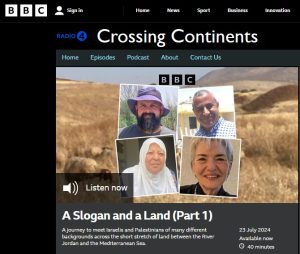
“Since the start of the war between Israel and Hamas last year, the cry “From the River to the Sea” has been heard more and more as a pro-Palestinian slogan. But what river? What sea? And what exactly does the phrase mean? It’s the subject of intense controversy. In this two-part series, reporter Tim Whewell travels from the River Jordan to the Mediterranean Sea, across a tiny stretch of land that’s perhaps the most argued-over in the world.”
“In this second part of his journey from the River Jordan to the Mediterranean Sea, across the Israeli-occupied West Bank and Israel, reporter Tim Whewell continues his exploration of the physical and human reality behind the slogan “From the River to the Sea”, a phrase which creates intense controversy.”
Early in part one of what is described as “a two-part journey to explore a slogan and a land”, Tim Whewell tells his listeners that: [emphasis in italics in the original]
Whewell: “As I started to hear the phrase ‘from the river to the sea’ more and more, I had a mad idea to try to find out on foot what the words really meant. It’s a pro-Palestinian slogan used most recently at protests against the war in Gaza. It’s precise meaning is the subject of intense controversy. Palestinians and Israelis generally understand it in different ways. I wanted to try and unpick the slogan, to feel, to measure the physical and human reality of those fifty-odd miles. To tramp across what’s probably the most contested stretch of land in the world.”
Leaving aside the fact that Whewell could no doubt have found stretches of land that are no less contested in – for example – Ukraine, Cyprus, Taiwan, the Falklands or Gibraltar, and that his “tramp” rapidly becomes a series of car journeys spread over eight days, it is notable that within five minutes or so, his aim has changed and is no longer “to try to find out” what the slogan he partly and partially quotes “really meant”.
Whewell: “These two programmes […] aren’t a definitive guide to the rights and wrongs of the Middle East conflict. They’re an attempt to find out what people think between the river and the sea since the October the 7th Hamas attack on Israel and the war that followed.”
Whewell’s choice of interviewees includes Palestinian and Israeli residents of Judea and Samaria, “activists” who are not always presented with full transparency such as Dror Etkes of the political NGO ‘Kerem Navot’ and Arab and Jewish Israelis from the centre of the country. Listeners hear a variety of views and opinions, including some which prompted notably tepid reactions from Whewell.
For example, one of Whewell’s contributors – Rashid – claims that Israelis living in Judea & Samaria are “trying to steal the Palestinian farmers’ style of life, you know, as shepherds. Even the same food, they’re trying to steal the culture, not just the land”. Whewell’s reply to that absurd claim is “They’re taking over your culture?”.
Another contributor – an Israeli “activist” at a location which listeners are not told is an illegal encampment in a military firing zone in the Jordan Valley – responds to Whewell’s question about why people are living in shacks and tents with the claim that the Bedouin “live in nature”, adding that “Some of the people in the Jordan Valley have houses in the towns in Palestine. It’s not so much about poverty. It’s more about the insistence to live your own way of life”. Whewell’s curiosity as to the strategy that lies behind people illegally setting up second homes in a closed military zone in Area C ends there.
When the same interviewee – a singer called Meira Asher – brings up the smears ‘coloniser’ and ‘apartheid’, Whewell’s response is to tap into another slogan used by anti-Israel activists.
Whewell: “So you’re saying this is a situation of colonisation that needs to be decolonised.”
Perhaps most revealing is Whewell’s response to an explanation he receives concerning a map on the wall of the council offices in the village of Duma (most recently in the headlines as the hometown of an ISIS-inspired terrorist), which he describes as a “map of Palestine from the river to the sea” which his interviewee tells him shows “Palestinian villages destroyed” in 1948 and 1967. Anwar Dawabshe goes on to state that “one day the people who are in this village will go back to their village in 1948”and when Whewell asks about the Jews living in Israel, he is told that:
Dawabshe: “They can go back home to Britain, to Morocco or whatever place they came from.”
Whewell: “They cannot stay here?”
Dawabshe: “No, they cannot stay here.”
Whewell could of course have ended his ostensible efforts to “find out” what the slogan ‘from the river to the sea, Palestine will be free’ as chanted at anti-Israel demonstrations “really meant” at that point. Instead, he chose to seek out a Jewish Israeli in Shilo in order to present an equivalence promoting mirror image to his listeners and avoided any serious discussion of the ethics of the ideology which seeks to destroy a sovereign country.
Listeners are told that:
Whewell: “About six million Palestinians are registered by the UN either as refugees who lost their homes as a result of the creation of Israel in 1948 or as their descendants.”
Listeners are however told nothing of the part played by Arab leaders in encouraging people to leave their homes both before and after the War of Independence and of course the topic of Jewish refugees from Arab lands is not mentioned at all.
No less significant than Whewell’s choice of interviewees are his partial and often airbrushed portrayals of history and geography.
Referring to what he calls an “apology for a river” – the River Jordan – Whewell tells listeners that:
Whewell: There’s the Kingdom of Jordan on the other bank – on the east bank – and Israeli-occupied territory here on the west.”
He goes on to present a potted history which notably excludes everything before the sixteenth century:
Whewell: “So this was Turkish – it was the Ottoman Empire – then it was British – Palestine, the Mandate between the two World Wars – then until 1967 it was Jordan and since 1967 it’s been controlled by Israel.”
Missing from that portrayal are of course the purpose of the Mandate entrusted to the British by the League of Nations – to establish a Jewish homeland, including in Judea & Samaria – and the fact that the territory was illegally invaded and occupied by Jordan between 1948 and 1967.
Clearly unconcerned by the fact that he is using terminology invented by the Jordanian occupiers (the clue is in the word West), Whewell goes on to tell listeners that:
Whewell: “Israel has occupied the West Bank since the Six Day War – 57 years ago.”
Whewell tells his listeners that the term Judea and Samaria is the “biblical and modern Israeli name for the West Bank”, failing to clarify that prior to the Jordanian invasion of the territory in 1948, the United Nations itself used the term.
While visiting Moshav Argaman in the Jordan Rift Valley, he tells Radio 4 listeners that:
Whewell: “When Israelis were just starting to settle the West Bank, often – as here at Argaman – it was on land that neighbouring Palestinian villages claimed was theirs. Most countries say the settlements are against international law.”
Whewell makes no effort to inform audiences of the ancient Jewish history in that region and, sticking to what has been BBC policy for years, fails to clarify that there are different opinions on the topic of ‘international law’.
Whewell’s portrayals of more recent history are little better. His explanation of the Oslo Accords is as follows:
Whewell: “The West Bank’s divided into areas – all very complicated – because of the provisions 30 years ago in the Oslo agreements between…between Israel and, well then, the PLO – the Palestinian leadership at the time – that said that Israel would control…who does build in this area.”
Whewell: “Under the Oslo agreements of the mid-1990s more than 60% of the West Bank – Area C, mainly rural land – stayed under full Israeli control. The agreements raised hopes for a Palestinian state on the West Bank and in Gaza but gradually that prospect grew dimmer and dimmer.”
Whewell has absolutely nothing to tell his listeners about the rise in Palestinian terrorism in the years immediately following the signing of the Oslo Accords, the Palestinian decision to launch the Second Intifada in 2000 or the repeated Palestinian refusals of offers to create a Palestinian state.
His downplaying of Palestinian terrorism is also evident in a part of the programme in which listeners are told that:
Whewell: “At least 15 Israelis have been killed by Palestinians on the West Bank since October 7th according to official Israeli statistics. And the Palestinian health ministry says more than 550 Palestinians have been killed by Israeli soldiers or settlers.”
Whewell’s portrayal fails to clarify that the vast majority of Palestinians killed during that time were either terrorists or males attacking forces engaged in counter-terrorism activity and airbrushes the context of the rise in terrorism in Judea and Samaria over the past three years which has been encouraged and facilitated by outside elements including Hamas and Iran.
The two episodes of Whewell’s programme together run to nearly eighty-eight minutes. As we see, even after listening to them, BBC Radio 4 audiences would be none the wiser about the “precise meaning” of the slogan ‘from the river to the sea, Palestine will be free’ (half of which is erased from Whewell’s accounts) or the real agenda of those who have been shouting that slogan on Britain’s streets and elsewhere for over nine months.


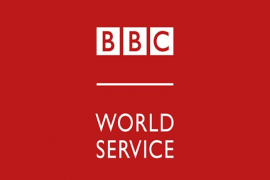
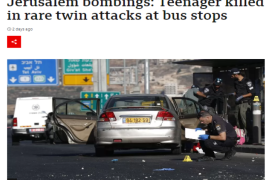
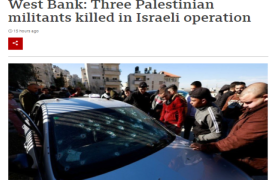
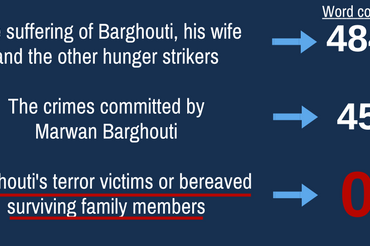
Whewell also fails to inform the IPC (aka BBC) audience that the West Bank is the place where real apartheid takes place – by opposing the rights of Jews to live there – because of their religion. But nobody now expects any such pro-Israel facts to be broadcast
The pro Islamic or anti Israel bias of the BBC News is plain for the world to see. Promoting a genocidal intent is definitely not allowed under the royal charter but nowadays nobody cares about the charter, it is just a minimum framework from which, the BBC operate, at a depth well below the water line #defundthebbc